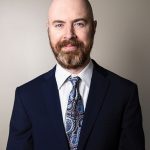SERVICE, SUPPORT AND STANDARDS
A solution-based approach to reducing risk and
insurance costs is driving success at a growing brokerage
By Michael Dollar
Our industry is increasingly opting for automation and convenience as acceptable ways to manage risk and serve clients. The ease of automated estimates, bot-generated customer interaction, policy creation via artificial intelligence, and online premium payments and claims processing have numbered both the policyholder and the insurance agent. In essence, we are throwing money and technology at issues as a solution to the problem
of risk.
Swiss Re estimates the 2023 P-C premium growth rate at around 8% and predicts 5% for 2024. These are fairly healthy increases; however, casualty recovery costs are skyrocketing. In fact, S&P notes that in 2022, the combined ratio climbed above 100% for the first time in five years. This comes despite anticipated direct written premium growth of 9.8%.
For independent brokers, it’s more of the same cyclical boom and bust that we’ve come to accept over the past decade.
A radical approach built on common sense
At Oakbridge, we take a different approach. We began with the idea of approaching insurance as a conversation about solutions to risk, rather than one focused on the premium costs. To protect our neighbors’ businesses and their livelihoods, we must go beyond just taking premiums and writing checks when there’s a loss.
For us, it means helping clients’ businesses thrive by working alongside them to provide proactive solutions that reduce the chance of a loss. We’ve intentionally set out to elevate the industry and, while our approach may seem time-intensive and costly in today’s marketplace, our growth and results prove otherwise.
What do we mean by a solution-based approach? We look for the root causes of risk facing any individual client and address those directly. For example, if a trucking client has a higher rate of accidents than the industry average, perhaps we can help them review and improve their driver training program to bring the number of accidents down.
It would be rare that a company might know that their exposure is out of line, be we can use our perspective across the sector to their individual advantage—rather than simply work to manage increased premiums on the back end.
A shared passion and purpose
We hire people who are passionate about what they do,
put them in the right place, give
them the tools they need and then get out of
the way so they can succeed.
Several years ago, we concluded that to elevate the industry, a new approach was needed—one based on both looking backwards and forward thinking, extensive research, a deep understanding of our clients, and integrity.
Four like-minded agencies joined forces with clear knowledge that our collective resources would be stronger than our individual ones. To be successful, we would have to provide a superior level of customer service, implement best-in-class back-office support, and maintain best practices operational standards—all in the name of a solutions-based commitment.
As business and personal P-C experts, we know that focusing entirely on cost may yield short-term benefits, but it comes up short in the long run. Together, my colleagues and I love this business. We aren’t in it to turn a short profit.
We’re committed to the communities where we work and live and we genuinely care for our neighbors and their well-being. These shared, “small town” values are at the core of our business model.
Reducing risk now to save future costs associated with casualties is part-and-parcel of how we do business. We’ve been able to take this core tenet and amplify it to a truly proactive stance that drives everything we do.
Our solutions-based approach impacts our team, our clients, and our growth model. This three-pronged strategy relies heavily on operational excellence and a high measure of teamwork.
A team dedicated to excellence
One of the most important traits our founding agencies shared was a commitment to superior service. A key aspect of this has been surrounding ourselves with the most qualified professionals in our field. We hire people who are passionate about what they do, put them in the right place, give them the tools they need and then get out of the way so they can succeed.
We provide industry-leading training and professional development throughout the organization. We orient the effort to finding solutions to our collective shortcomings and delivering for the client, and then educate ourselves and our colleagues.
We constantly strive for self-improvement. This is part of our culture and is directly distilled from that overarching, common-sense, proactive posture.
Rest assured; we haven’t let ourselves get behind on technological advances. Just as we seek solutions for our clients, we apply those sharpened skills to ourselves. We’ve intentionally invested in back-office operations both in terms of people and technology.
By centralizing our claims process, for example, we’ve been able to significantly boost claims efficiency, which is a key driver of customer satisfaction and sustained, organic revenue growth.
As we’ve expanded our teams, we’ve sought out key personnel and agency partners who bring different sets of carrier relationships and varying lines of business. Ultimately, this bolsters our solutions and service offerings and deepens our ability to provide expert risk reduction and high-value coverage.
Helping clients thrive
Our collective and individual successes are the result of relationships we’ve cultivated throughout our careers. Deep relationships enable us to know our clients and their businesses intimately.
We start by listening to their business goals, the obstacles they face, and the particular needs they have. We do this for three reasons. The first is to have a comprehensive understanding of their business operations. The second is to begin tailoring customized coverage plans to meet that risk.

What’s unusual is the third aspect of our approach—this rigorous analysis and examination of the operation helps to develop real solutions that reduce risk. Reduced risk means reduced cost to the client. We can apply this process to any type of business. And, because we have deep relationships with a wide variety of carriers, we can provide coverage to fit almost any operation.
Not simply growth for growth’s sake
To achieve the goal of elevating our industry, it was apparent that we would have to scale the Oakbridge concept. We’ve continually partnered with independent producers and agencies who have developed excellent books of business and want to continue to expand. We’ve held on to that philosophy as we’ve grown.
As an integrator rather than an aggregator, we’ve taken the route of choosing partners who share our values and work ethic, have similar cultures, and bring a unique set of business attributes, whether they be coverage lines, geographic footprint, or carrier relationships.
This deliberate, careful growth strategy dovetails with the solutions approach and creates organic revenue streams. Our best-in-class back-office model solves the challenge of integration and frees partner producers, often the founders of their firms, to do what they love best—grow their business and serve their clients.
Results that reinforce our values
Providing proactive solutions creates immediate benefit—for the business, our clients, and our communities.
One recent example stands out. For a high-risk client repeatedly turned down for coverage by multiple carriers, we thoroughly examined the client’s injured employee procedures and launched several recommendations. These included establishing a job candidate screening program, implementing an effective employee safety onboarding and training program, properly documenting refusals to seek medical care, and training with qualified physicians to create light-duty work positions that sped return to work. We also helped ensure subcontractors carried their own workers compensation to transfer risk.
Our efforts lowered their mod from 1.86 to 1.04, reduced their premium costs by $200,000 and lowered the number of annual workers compensation claims from 10 to one.
There are countless examples and endless opportunities where proactive risk management, deep industry knowledge and a strong commitment to our clients resulted in high-value service. Our higher-level, solutions-based approach impacts every bit of our success today: growth, culture, professional development, partner integration, carrier relationships and service delivery. The strategy is built on combining the strengths of an independent agency with the resources and flexibility of a large brokerage.
Sharing our knowledge to change the industry
Most important, our solutions-forward posture strengthens our relationships in the communities where we live and work. It is directly derived from and continually reinforces our core values: community, collaboration, integrity, accountability, specialization, and expertise. A logical extension of this commitment is to provide a “Checklist of Ten Questions to Proactively Ask Your Clients:”
- What are a client’s risk exposure and related insurance premiums?
- Are those premiums higher than the industry average in any way?
- What are the root causes of your client’s risk?
- What are they doing well related to managing this risk?
- What could they do better with respect to managing this risk?
- How are their competitors addressing the risk and what other research and/or data would help?
- What are the recommendations for improving that effort and addressing this risk and on what timeline?
- How much would that effort cost vs. increased premiums?
- What is the result on insurance premiums and other client business operations?
- What are the outcomes after the changes are made and what more can be done?
We hope these questions have a positive impact for you, your agency and your clients.

The author
Michael Dollar is chief operating officer at Oakbridge Insurance. He was previously a principal at Hutchinson Traylor, one of Oakbridge’s four founding independent insurance agencies. He is a graduate of LaGrange College and earned his master’s in business administration from the University of Georgia’s Terry College of Business. He can be reached at (706) 884-2361.




